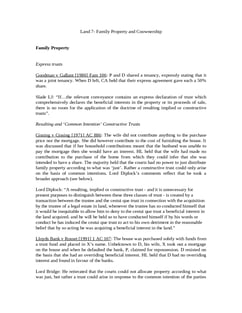Marks and Spencer plc v BNP Paribas Securities Services Trust Company (Jersey) Ltd [2015] UKSC 72
Judgement for the case Marks and Spencer plc v BNP Paribas Securities Services Trust Company (Jersey) Ltd
Table Of Contents
KEY POINTS
There was no implied term in this case. In order to include a term in the lease, there must be either clear evidence that the parties intended to include the term or a business necessity for that term. This is because the lease is a professional and well-drafted document.
A clause can only be implied into a contract if it is necessary to give business efficacy to the contract or if it is so obvious that the parties intended to include it that it goes without saying. Both of these tests are assessed objectively.
The test of necessity is one of absolute necessity, not just reasonable necessity. Absolute necessity means that the contract does not work at all or only works in an absurd fashion.
In determining the implication of a term, it is not necessary to establish the actual intention of the parties. Instead, one should consider what reasonable people in the same situation would have agreed upon at the time of contracting.
FACTS
Appellant Marks & Spencer (“M&S”) sub-underleased four different floors in a building from Defendant BNP Paribas Securities Services Trust Company (“BNP”) from 2006 to 2018.
The Lease outlined the rent payable in quarterly instalments. It also contained a break clause that allows M&S to end the Lease by giving six months’ notice and provided that there were no rent arrears.
In July 2011, M&S served a break notice on BNP and paid the necessary amounts, causing the Lease to terminate in January 2012.
M&S claimed for the return of the rent and other dues paid in advance for the quarter that followed after the termination of the lease, contending that a term mandating this repayment should be inferred into the lease.
COMMENTARY
The Court, speaking through Lord Neuberger, raised that interpreting the words used by the parties and implying terms into it both involve defining the extent and significance of the agreement.
However, Lords Carnwath and Clarke were of the opinion that they were not distinct from one another.
For Further Study on Marks and Spencer plc v BNP Paribas Securities Services Trust Company (Jersey) Ltd

Land Law notes fully updated for recent exams at Oxford and Cambridge. ...
Need instant answers? Our AI exam tutor is here to help.
Ask questions 🙋 Get answers 📔 It's simple 👁️👄👁️
Our AI is educated by the highest scoring students across all subjects and schools. Join hundreds of your peers today.
Get StartedSimilar Cases
Related Product Samples
These product samples contain the same concepts we cover in this case.
| Land Law | Leases Notes (77 pages) |
| Contract Law | Terms Of The Contract Pq & Essay Notes Notes (87 pages) |

 Since 2010, Oxbridge Notes has been a trusted education marketplace, supplying high-quality materials from top achievers at universities like Oxford, Cambridge, LSE, Harvard, and Yale.
Since 2010, Oxbridge Notes has been a trusted education marketplace, supplying high-quality materials from top achievers at universities like Oxford, Cambridge, LSE, Harvard, and Yale.